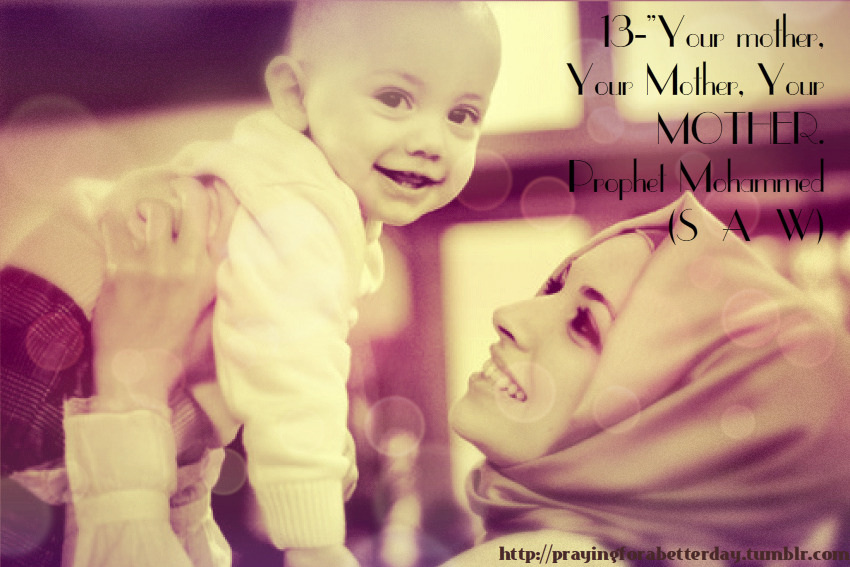Sosiaalisesta näkökulmasta naisen asemaa voidaan tarkastella kolmessa osassa: 1) lapsena ja murrosikäisenä, 2) aviovaimona sekä 3) äitinä.
Ensimmäisessä osassa tarkastelen naisen asemaa lapsena ja murrosikäisenä. Islamia ennen ja sen alkuvaiheilla jotkut arabiheimot saattoivat hyväksyä tyttövauvojen surmaamisen, mutta pyhässä Koraanissa sanotaan suoraan tämän tavan olevan väärä, ja sitä pidetään muiden murhien veroisena rikoksena (Koraani, 81:8-9, 16:58-59). Profeetta Muhammed (saas) sanoi: Se, jolla on tytär ja joka ei hautaa häntä elävältä eikä loukkaa häntä eikä aseta poikansa etusijalle, hänet Jumala päästää paratiisiin.
Women's state can be viewed in three parts from the social point of view:
1) As a kid and as an adolescent, 2) as a wife and, 3) as a mother.
In the first part, I am going to examine woman's state as a kid and as an adolescent. Before Islam and in the early stage of Islam, some Arabic tribes might have accepted girl babies murder, however according to the Holy Quran, it's wrong and it's a crime just like any other crime. (Quran 81:8-9, 16:58-59). Prophet Muhammed (pbuh) has said: The one, who has a daughter and doesn't bury her alive, doesn't hurt her nor gives his son the priority, is someone whom God let's in paradise.
1) As a kid and as an adolescent, 2) as a wife and, 3) as a mother.
 |
| source |
Toisessa osassa sosiaalista näkökulmaa käsittelen naisen oikeuksia aviovaimona. Islamissa avioliitto perustuu rakkauteen ja armeliaisuuteen. Islamin lain mukaan naista ei saa pakottaa naimisiin, suostumus on oltava naiselta. Naisella on täysi oikeus mahriin eli myötäjäisiin, jotka aviomies antaa hänelle. Mahr sisältyy avioehtosopimukseen, joka tehdään kaikille naimisiin meneville. Mahr ei Islamissa ole todellinen eikä vertauskuvallinen maksu naisesta kuten joissain muissa kulttuureissa, vaan se on lahja, joka kuvastaa rakkautta ja kiintymystä. Tällä lahjalla nainen valmistautuu häihin. Avioelämän säännöt ovat islamissa selvät, ja ne takaavat kummallekin sukupuolelle yhtäläiset oikeudet ja velvollisuudet toisiaan kohtaan. ”Naisilla on sama oikeus miehiin nähden kuin miehillä heihin, kuten on kohtuullista; kuitenkin ovat miehet naisiin verrattuna korkeammassa asemassa”. (Koraani 2: 228). Tämä jae tarkoittaa sitä, että mies on perheen "johtaja". Se ei kuitenkaan tarkoita korkeampaa asemaa tai etuasemaa islamin lain kannalta.
 |
| source |
Kolmannessa osassa käsittelen naisen asemaa äitinä. Islamin arvojärjestyksessä vanhemmat asettuvat heti Jumalan jälkeen. ''Olemme myös määrännyt ihmisen pitämään huolta vanhemmistaan; hänen äitinsä on kantanut häntä äärimmäiseen uupumukseen saakka, ja hänen vieroittamisensa on kestänyt toista vuotta. Kiitä Minua ja molempia vanhempiasi. Minun luokseni on kaikkien palattava” ,(Koraani 31:14). Koraanissa on erityinen suositus, joka koskee äitien hyvää kohtelua. Eräät kuuluisat Profeetta Mohammedin (saas) sanat : ”Paratiisi on äidin jalkojen juuressa”. Eräs mies kysyi Profeetta Mohammedilta (saas) ”Oi Jumalan sanansaattaja, kuka ihmisistä parhaiten ansaitsee hyvän seurani?”, Profeetta vastasi: : ”Äitisi”. Mies kysyi: ”Entä kuka muu?” Profeetta vastasi: ”Äitisi”. Silloin mies kysyi: ”Entä kuka muu?” Silloin Profeetta vastasi: ”Isäsi”. Islamin uskonto antaa vanhemmille hyvin suuren aseman, ja varsinkin äidille.
 |
| source |
Love/Rakkaudella
A.A

Ei kommentteja:
Lähetä kommentti